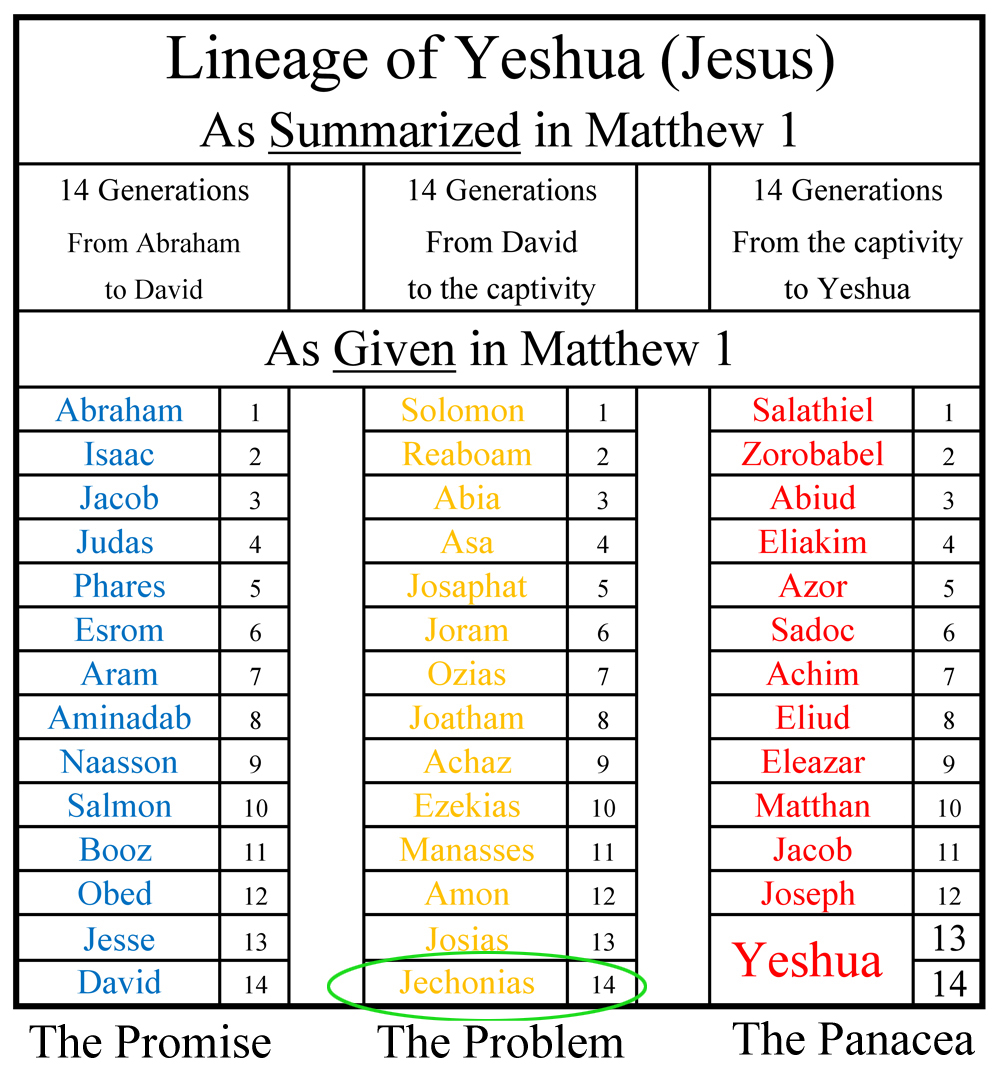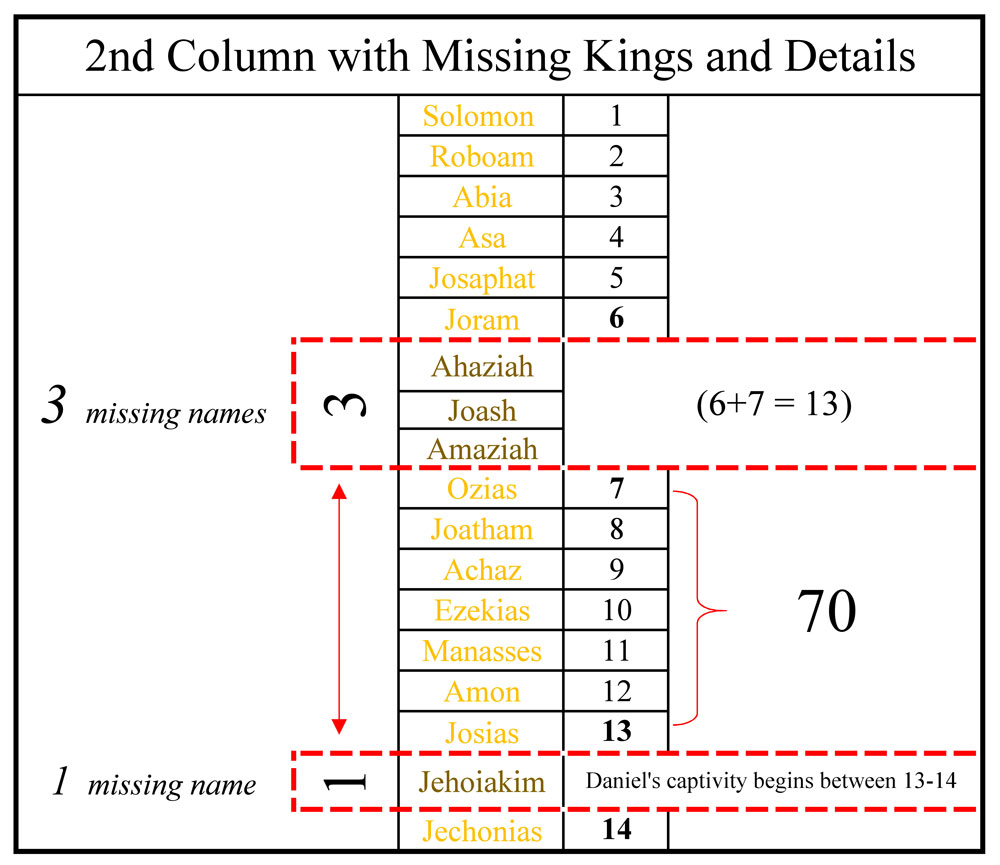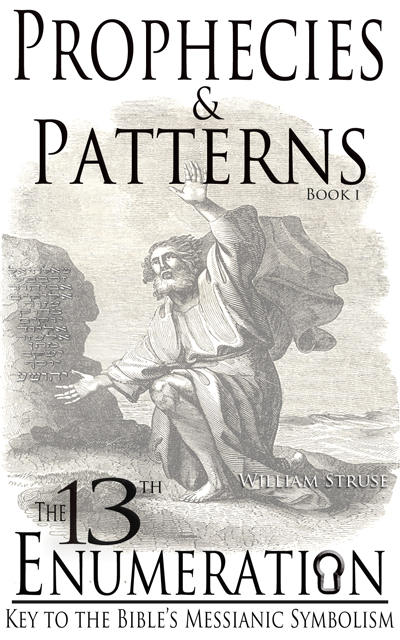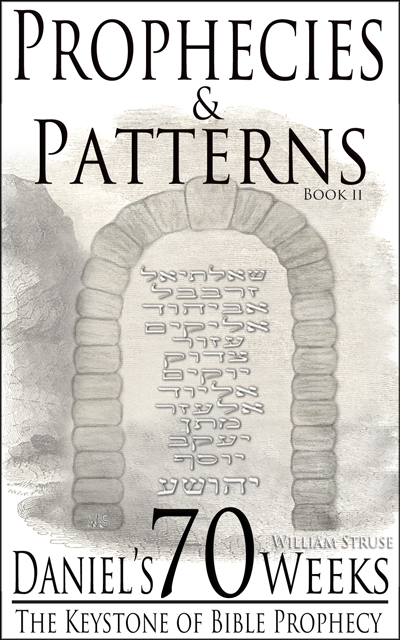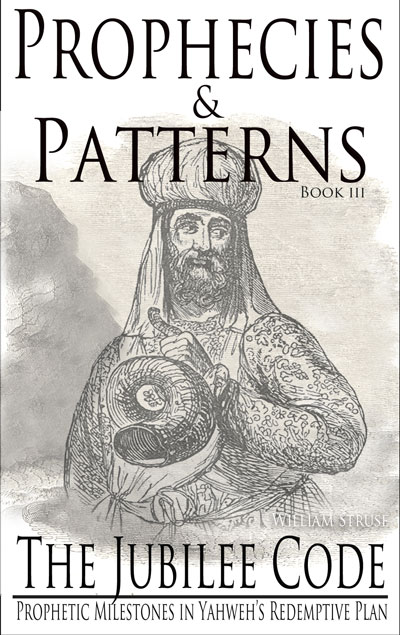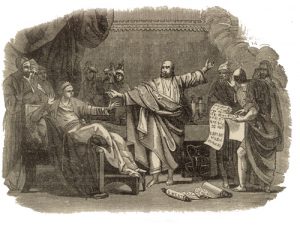 Can you imagine having a curse placed upon you and all of your descendants by the living God of the Bible? If there was ever a hopeless condition that would be it, don’t you think? Well, that’s what happened to one wicked king of Judah in the days of Jeremiah. But this story doesn’t go the way you might expect, instead it has a remarkable ending which shows Yahweh’s redemptive love. So if you have a few minutes I hope you’ll let me tell you the story of the curse of Coniah and the promised Messiah.
Can you imagine having a curse placed upon you and all of your descendants by the living God of the Bible? If there was ever a hopeless condition that would be it, don’t you think? Well, that’s what happened to one wicked king of Judah in the days of Jeremiah. But this story doesn’t go the way you might expect, instead it has a remarkable ending which shows Yahweh’s redemptive love. So if you have a few minutes I hope you’ll let me tell you the story of the curse of Coniah and the promised Messiah.
As I live, saith YHWH, though Coniah the son of Jehoiakim king of Judah were the signet upon my right hand, yet would I pluck thee thence;
Thus saith YHWH, Write ye this man childless, a man that shall not prosper in his days: for no man of his seed shall prosper, sitting upon the throne of David, and ruling any more in Judah. (Jeremiah 22:24, 30)
Pretty hopeless, don’t you think?
Now let me challenge you with what seems like a Biblical paradox. The curse of Coniah (aka Jechonias) is only part of the story. The New Testament tells us that this cursed king was in fact one of the ancestors of Yeshua (Jesus) the Messiah. Take a look as this chart showing the lineage of Yeshua as given in Matthew 1.
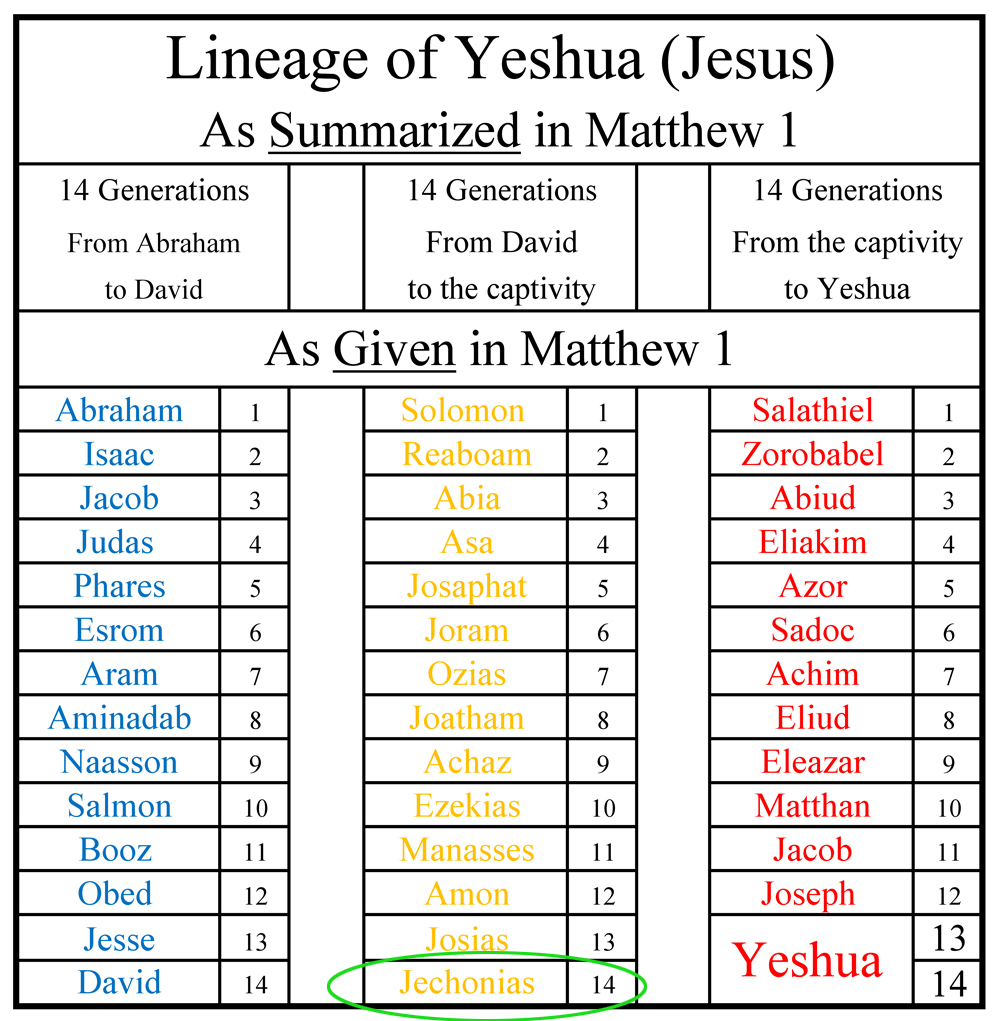 Wait… how can a man cursed through all his generations someday produce the Messiah you might ask?
Wait… how can a man cursed through all his generations someday produce the Messiah you might ask?
With man this would be impossible, but with Yahweh nothing is impossible. This fascinating paradox is resolved by a wonderful prophetic promise given to the grandson of king Coniah (Jechonias). That promise was given to a man named Zerubbabel about seventy years after Yahweh cursed Coniah and it is the key to unlocking this conundrum.
Our story begins roughly seventy years after Jerusalem’s desolations by king Nebuchadnezzar. You see, Jerusalem had lain desolate for 70 years and then when Yahweh’s divine calendar reached that special date He, the living God of the Bible, stirred up a Persian king named Cyrus to allow the Jewish people to return and build the temple and Jerusalem so that His word, given to the prophet Jeremiah, might be fulfilled.
In the first year of his reign I Daniel understood by books the number of the years, whereof the word of YHWH came to Jeremiah the prophet, that he would accomplish seventy years in the desolations of Jerusalem. (Daniel 9:2)
For thus saith YHWH, That after seventy years be accomplished at Babylon I will visit you, and perform my good word toward you, in causing you to return to this place. (Jeremiah 29:10)
It was Coniah’s grandson, Zerubbabel, along with the high priest Joshua (Hebrew = Yeshua) who led the resettlement of Jerusalem when King Cyrus of Persia decreed the Jewish people’s return. Zerubbabel and Yeshua left Persia with good intentions, but when they reached Jerusalem they only got as far as laying some of the temple foundation stones before their zeal for Jerusalem’s restoration was tempered by the harsh realities of their desolate homeland.
So for the next sixteen years not much work was done on Yahweh’s house. Instead the people built their own houses. Then Yahweh, when the time was right, reached down into history and personally commanded His people to “restore and build Jerusalem.”
For those of you who have read Book II in my Prophecies & Patterns series: Daniel’s 70 Weeks: The Keystone of Bible Prophecy, you know this divine command (Hebrew dabar) given by the living God of the Bible and witnessed by the prophets Haggai and Zechariah, began the prophesied countdown to the Messiah.
So the angel that communed with me said unto me, Cry thou, saying, Thus saith YHWH of hosts; I am jealous for Jerusalem and for Zion with a great jealousy. And I am very sore displeased with the heathen that are at ease: for I was but a little displeased, and they helped forward the affliction.
Therefore thus saith YHWH; I am returned to Jerusalem with mercies: my house shall be built in it, saith YHWH of hosts, and a line shall be stretched forth upon Jerusalem.
Cry yet, saying, Thus saith YHWH of hosts; My cities through prosperity shall yet be spread abroad; and YHWH shall yet comfort Zion, and shall yet choose Jerusalem. (Zechariah 1:14-17)
It was that same year in 520 BC, (the 2nd year of Darius, the Great Artaxerxes) that the prophet Haggai received a prophecy concerning Zerubbabel, and the coming of the Messiah. Remember this prophecy was given within the context of Zerubbabel’s and Joshua’s (Yeshua’s) restoration of the temple and Jerusalem. Here take a look:
Yet now be strong, O Zerubbabel, saith YHWH; and be strong, O Joshua [Yeshua], son of Josedech, the high priest; and be strong, all ye people of the land, saith YHWH, and work: for I am with you, saith YHWH of hosts: according to the word that I covenanted with you when ye came out of Egypt, so my spirit remaineth among you: fear ye not.
For thus saith YHWH of hosts; Yet once, it is a little while, and I will shake the heavens, and the earth, and the sea, and the dry land; And I will shake all nations,
and the desire of all nations shall come: and I will fill this house with glory, saith YHWH of hosts . . .
Consider now from this day and upward, from the four and twentieth day of the ninth month . . .
And again the word of YHWH came unto Haggai in the four and twentieth day of the month [the second year of Darius, i.e. 520 BC], saying, Speak to Zerubbabel, governor of Judah, saying, I will shake the heavens and the earth; and I will overthrow the throne of kingdoms, and I will destroy the strength of the kingdoms of the heathen; and I will overthrow the chariots, and those that ride in them; and the horses and their riders shall come down, every one by the sword of his brother.
In that day, saith YHWH of hosts, will I take thee, O Zerubbabel, my servant, the son of Shealtiel, saith YHWH, and will make thee as a signet: for I have chosen thee, saith YHWH of hosts. (Haggai 2:4–7, 20–23)
A Signet of YHWH
Notice in this passage it seems to speak of two comings of the Messiah. One when the “desire of all nations shall come” and YHWH’s house is again filled with glory and then another time when Zerubbabel, “my servant,” would become a “signet” or seal in the hand of YHWH to overthrow the kingdoms of this world and “shake the heavens and the earth”.
Now to understand the full miraculous wonder of this prophecy, let’s take a look again at the curse pronounced against Coniah:
As I live, saith YHWH, though Coniah the son of Jehoiakim king of Judah were the signet upon my right hand, yet would I pluck thee thence; and I will give thee into the hand of them that seek thy life, and into the hand of them whose face thou fearest, even into the hand of Nebuchadrezzar king of Babylon, and into the hand of the Chaldeans. And I will cast thee out, and thy mother that bare thee, into another country, where ye were not born; and there shall ye die. But to the land whereunto they desire to return, thither shall they not return.
Is this man Coniah a despised broken idol? is he a vessel wherein is no pleasure? wherefore are they cast out, he and his seed, and are cast into a land which they know not? O earth, earth, earth, hear the word of YHWH.
Thus saith YHWH, Write ye this man childless, a man that shall not prosper in his days: for no man of his seed shall prosper, sitting upon the throne of David, and ruling any more in Judah. (Jeremiah 22:24–30, emphasis mine.)
Did you catch that? Even if Coniah were a “signet” upon YHWH’s hand, none of his seed would prosper in sitting upon the throne of David. Yet Haggai prophesies that someday Zerubbabel, and by implication his offspring, would become a “signet” upon the hand of YHWH—in a passage with a strong Messianic context. How could the cursed lineage of Coniah bring forth the future Messiah? How is this conundrum rectified?
Zechariah 4 gives us the answer in a word to Zerubbabel:
This is the word of YHWH unto Zerubbabel, saying,
Not by might, nor by power, but by my spirit, saith YHWH of hosts.
Who art thou, O great mountain? before Zerubbabel thou shalt become a plain: and he shall bring forth the headstone thereof with shoutings, crying, Grace, grace unto it.
Moreover the word of YHWH came unto me, saying, The hands of Zerubbabel have laid the foundation of this house; his hands shall also finish it; and thou shalt know that YHWH of hosts hath sent me unto you. For who hath despised the day of small things? for they shall rejoice, and shall see the plummet in the hand of Zerubbabel with those seven; they are the eyes of YHWH, which run to and fro through the whole earth. (Zechariah 4:6–10)
And one of the elders saith unto me, Weep not: behold, the Lion of the tribe of Juda, the Root of David, hath prevailed to open the book, and to loose the seven seals thereof. And I beheld, and, lo, in the midst of the throne and of the four beasts, and in the midst of the elders, stood a Lamb as it had been slain, having seven horns and seven eyes, which are the seven Spirits of God sent forth into all the earth. (Revelation 5:5–6, emphasis mine)
Not by Power nor by Might
Did you catch it? “Not by might nor by power, but by my spirit” was the promise given to Zerubbabel. The Messiah then didn’t come through human power or might but by Yahweh’s spirit.
One of the most powerful examples of this promise is found in the first chapter of the New Testament and the lineage of Yeshua represented there.
In Matthew 1 it shows us that Joseph—and by implication his great-great-great-great-great-great-great-great-great-great-great-grandfather Zerubbabel, was only the legal father of Yeshua. The “seed” of Yeshua came not by their human power or might, but by the Spirit of Yahweh.
Matthew 1 and Isaiah 7 explain it this way:
Now the birth of Jesus Christ was on this wise: When as his mother Mary was espoused to Joseph, before they came together,
…she was found with child of the Holy Spirit.
Then Joseph her husband, being a just man, and not willing to make her a publick example, was minded to put her away privily. But while he thought on these things, behold, the angel of YHWH appeared unto him in a dream, saying…
Joseph, thou son of David, fear not to take unto thee Mary thy wife: for that which is conceived in her is of the Holy Spirit.
And she shall bring forth a son, and thou shalt call his name Yeshua [Yeshua = YHWH’s salvation]: for he shall save his people from their sins. Now all this was done, that it might be fulfilled which was spoken of YHWH by the prophet, saying, Behold, a virgin shall be with child, and shall bring forth a son, and they shall call his name Emmanuel, which being interpreted is, God with us. (Matthew 1:18–23, emphasis mine)
And he said, Hear ye now, O house of David; Is it a small thing for you to weary men, but will ye weary my God also? Therefore YHWH himself shall give you a sign; Behold, a virgin shall conceive, and bear a son, and shall call his name Immanuel. (Isaiah 7:13–14)
By the Spirit of YHWH indeed!
Think about this for a moment. Yeshua’s human lineage must have come through Mary (Luke 3), but the lineage, as represented by apostle Matthew (Matthew 1), shows us how the Messiah came not by human power or might, but by the Spirit of YHWH. YHWH stood in place of the cursed Coniah and his ancestors. He became the kinsman redeemer who raised up the promised seed upon the throne of David – by His spirit.
For those of you who read my last article Homo Deus, you saw how Satan has long deceived mankind into believing that we can achieve immortality by our own efforts. Long ago in Eden, he whispered the lie that mankind, by our own power and might, can become Homo Deus or God men.
But that is not Yahweh’s plan for mankind. As with the curse of Coniah and the promise of the coming Messiah, mankind can only be restored to their intended state by Yahweh’s spirit made flesh, that is Yeshua – Yahweh’s Salvation.
Take a look once more at Matthew’s amazingly clever list of names. This list is such a wonderful spiritual metaphor for Yahweh’s redemptive purposes.
The First 14 Generations – The Promise
The first column begins with Abraham and ends with king David. As I explained in Book II – Daniel’s 70 Weeks: The Keystone of Bible Prophecy, it was Abraham with whom Yahweh swore (shaba) the first oath with any man in the Bible (Gen 22 & 26). This oath was in part the promise that through Abraham’s “seed” all nations of the earth would be blessed. When talking to Isaac, Yahweh explained it this way:
Sojourn in this land, and I will be with thee, and will bless thee; for unto thee, and unto thy seed, I will give all these countries, and I will perform the oath which I sware unto Abraham thy father; And I will make thy seed to multiply as the stars of heaven, and will give unto thy seed all these countries; and in thy seed shall all the nations of the earth be blessed; (Genesis 26:3-4)
This oath (shebuw’ah) which Yahweh swore (shaba) in Gen. 22 was later described by Moses in Deut. 7:7-26 as the “covenant and mercy” promised to the fathers Abraham, Isaac, and Jacob. (Due. 9:5)
The prophet Daniel appropriately mentioned this “covenant and mercy” when he petitioned Yahweh to forgive his people and restore Jerusalem in Daniel 9:4. Shortly thereafter YHWH sent the angel Gabriel to Daniel with the prophecy of 70 Weeks which gave the precise date when this “covenant and mercy” would come.
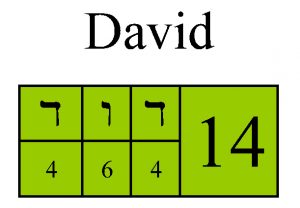 But back to the first group of names in Matthew’s famous list now. The first 14 generations of Yeshua’s lineage ends with king David who was a symbol of a yet future Messianic king. Emphasizing this point is the fact that David’s name has the Hebrew letter value of 14.
But back to the first group of names in Matthew’s famous list now. The first 14 generations of Yeshua’s lineage ends with king David who was a symbol of a yet future Messianic king. Emphasizing this point is the fact that David’s name has the Hebrew letter value of 14.
Now to give you a sense of how important these first 14 generations are in Yahweh’s redemptive plan, here are the words of Zacharias, the father of John the Baptist; putting it all together for us:
And his father Zacharias was filled with the Holy Ghost, and prophesied, saying, Blessed be the Lord God of Israel; for he hath visited and redeemed his people,
And hath raised up an horn of salvation for us in the house of his servant David;
As he spake by the mouth of his holy prophets, which have been since the world began: That we should be saved from our enemies, and from the hand of all that hate us;
To perform the mercy promised to our fathers, and to remember his holy covenant; The oath which he sware to our father Abraham,
That he would grant unto us, that we being delivered out of the hand of our enemies might serve him without fear, In holiness and righteousness before him, all the days of our life. (Luke 1:67-75)
Wonderfully congruent, isn’t it? Here, Zacharias, talking about the future Messiah Yeshua, describes Him as the “horn of salvation” from the house of David, in fulfillment of the covenant and mercy which was the ancient promise or oath (shebuw’ah) Yahweh swore (shaba) with Abraham.
The Second 14 Generations – The Problem
But now the Problem of the second 14 generations described by Matthew. This grouping begins with Solomon and ends with the cursed Coniah (Jechonias). It would be hard to find another list of names in the Bible that better represents the fallen sinful nature of mankind!
Solomon was the son of king David and Bathsheba. It was David and Bathsheba’s illicit affair, which resulted in David murdering Bathsheba’s husband, which in turn eventually led to the birth of Solomon. That second grouping of 14 generations represents the height of Israel as a nation, its division, idolatrous demise, and its heartbreaking destruction, and captivity. To mark the 14th generation, Matthew ends the lists with the cursed king Coniah.
I should mention something here so that you really grasp the significance of Coniah as the 14th generation. It was no cosmic accident. You see, in order to make 14 generations from Solomon to Coniah, Matthew had to leave out 4 of Yeshua’s ancestors. That’s right, Matthew purposely arranged the list. Here take a look:
Consider that for a minute. Matthew could have easily made the righteous Josias the 14th generation, but instead he named the only king in the Bible who was personally cursed along with all his offspring. (Interestingly, if you add those 4 missing kings back into this list of 14 names you get 18 names instead (6+6+6).)
In any case, a reasonable argument can be made, that the second grouping of 14 generations of Yeshua’s ancestors is a clever metaphor for the curse of sin. Those kings represent the problem of mankind’s fallen state.
The Third 14 Generations – The Panacea
Thankfully the symbolism doesn’t end with the curse of Coniah. Matthew gives us the final grouping of names which he represents as 14 generations. I say represents, because if you actually count the names in Matthew 1 you’ll find that in fact there are only 13 names in the third generational grouping. Yeshua, the Messiah is the 13th generation, or what I like to call the 13th Enumeration.
You see Matthew completes Yeshua’s lineage with compelling symbolism which testifies to the Old Testament’s description of the Messiah as both a suffering servant and ruling king. Yeshua as the suffering servant, the atonement sacrifice, and the kinsman redeemer, was the 13th generation. He is both a man (6) and divine perfection (7), thus he is the true Homo Deus (God man – 13).
Then by His sacrificial death and resurrection Yeshua became the 14th generation thus completing symbolism of Matthew’s list. Yeshua – Yahweh’s Salvation, became mankind’s panacea or in other words he became our cure.
Fantastic symbolism, don’t you think?
And just in case you don’t get the messianic symbolism, consider the meaning of the names in each of the 13 & 14 generations.
• 13 – Jesse = I possess
• 14 – David = Beloved
• 13 – Josias = Whom Yahweh heals
• Jehoiakim = Yahweh raises up (missing)
• 14 – Jechonias = Yahweh establishes
• 13 – Yeshua = Yahweh’s Salvation
• 14 – Yeshua
Or in other words:
I possess, beloved whom Yahweh heals, he raises up & establishes His Salvation – Yeshua!
Zerubbabel as the Great Leveler
Before leaving the subject of Coniah, Zerubbabel, and Yeshua, I would like to look at just one more Messianic thread woven into Zechariah 4. The literal context of this passage shows us that Zerubbabel was the man responsible for laying the temple’s foundation, as well as bringing forth its final headstone—the top stone or capstone if you will. Messianic symbolism aside, this building process required another important step. Zechariah 4:7–10 explains:
Who art thou, O great mountain? before Zerubbabel thou shalt become a plain: and he shall bring forth the headstone thereof with shoutings, crying, Grace, grace unto it.
Moreover the word of YHWH came unto me, saying, The hands of Zerubbabel have laid the foundation of this house; his hands shall also finish it; and thou shalt know that YHWH of hosts hath sent me unto you. For who hath despised the day of small things? for they shall rejoice, and shall see the plummet in the hand of Zerubbabel with those seven; they are the eyes of YHWH, which run to and fro through the whole earth. (Zechariah 4:7–10)
Isaiah 28 and Zechariah 1 both continue the construction theme and apply it to the coming of the Messiah. Note especially Zechariah 1:14–16 below, because this divine command to “restore and build Jerusalem” played a central part in the divine command to restore and build Jerusalem as I explained in Book II of my series on Prophecies and Patterns—Daniel’s 70 Weeks: The Keystone of Bible Prophecy.
Therefore thus saith the Lord, YHWH, Behold, I lay in Zion for a foundation a stone, a tried stone, a precious corner stone, a sure foundation: he that believeth shall not make haste. Judgment also will I lay to the line, and righteousness to the plummet: and the hail shall sweep away the refuge of lies, and the waters shall overflow the hiding place. (Isaiah 28:16–17)
So the angel that communed with me said unto me, Cry thou, saying, Thus saith YHWH of hosts; I am jealous for Jerusalem and for Zion with a great jealousy. And I am very sore displeased with the heathen that are at ease: for I was but a little displeased, and they helped forward the affliction.
Therefore thus saith YHWH; I am returned to Jerusalem with mercies: my house shall be built in it, saith YHWH of hosts, and a line shall be stretched forth upon Jerusalem. (Zechariah 4:7–10)
Before the Second Temple could be constructed, the place upon which it was to be built had to be leveled. Zechariah 4:7 explains that Zerubbabel had to make the mountain a “plain.” The Hebrew word here is miyshowr, and it is used primarily to refer to leveling something, in a symbolic sense, though the word means uprightness or righteousness. Miyshowr is the very same term used in the famous Messianic passage of Isaiah 40—the same passage John the Baptist proclaimed in Luke 3 concerning the coming of the Messiah:
Comfort ye, comfort ye my people, saith your God. Speak ye comfortably to Jerusalem, and cry unto her, that her warfare is accomplished, that her iniquity is pardoned: for she hath received of YHWH’s hand double for all her sins. The voice of him that crieth in the wilderness, Prepare ye the way of YHWH, make straight in the desert a highway for our God. Every valley shall be exalted, and every mountain and hill shall be made low: and the crooked shall be made straight, and the rough places plain. (Isaiah 40:1–4, emphasis mine)
The word of God came unto John the son of Zacharias in the wilderness. And he came into all the country about Jordan, preaching the baptism of repentance for the remission of sins; as it is written in the book of the words of Esaias the prophet, saying, The voice of one crying in the wilderness, Prepare ye the way of YHWH, make his paths straight. Every valley shall be filled, and every mountain and hill shall be brought low; and the crooked shall be made straight, and the rough ways shall be made smooth; and all flesh shall see [Yeshua] the salvation of God [Yeshua = Salvation of YHWH]. (Luke 3:2–6, emphasis mine)
Nothing Is Impossible with Yahweh
In closing if there is one lesson to be learned from the Curse of Coniah and the Prophecy given to Zerubbabel, it is that nothing is impossible with Yahweh. No matter what your circumstances in life, our Creator can use you for His honor and glory if you are willing. He loves you and wants you to be part of His redemptive plan for mankind.
So next time someone tells you, that the crooked cannot be made straight, the sinner cannot be made righteous, the blind will never see, a virgin could never bear a future king, or a cursed king could never produce the promised Messiah, just tell them the story of Coniah and Zerubbabel. Tell them the story of a cursed man who brought forth the Headstone, not by his own power or might, but by the Spirit of Yahweh.

